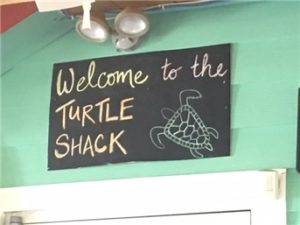Plague Journal, Boredom
Boredom
dominates the widening gap
between subject and world,
between freedom and facticity,
between action and being.
The Dasein that is determined to act,
is no longer familiar with the feeling of being-surrounded
or of being-taken-in.
The ‘point’ of the ‘moment’,
as the temporal form of the self,
lacks the width and length of ‘home’,
the space for dwelling and lingering.
…’home’ signifies the place which precedes
the acting subject, the place to which one entrusts
oneself, and which
has always already taken in
the acting self.
— Excerpt, The scent of time by Byung-chul Han, p. 83
 W
W e visited the Tortugas’ Lie restaurant for our last evening meal before leaving the Outer Banks. Tortuga is Spanish for turtle and Lie means resting place, lair. I read that the restaurant is the best seafood dive bar on the North Carolina coast. There was a good vibe in the room. I observed the patrons coming and going around us. I asked myself a question which has come to mind often lately: How many of my fellow Americans are frankly bored with their lives? How many of us upper middle class Americans are bored, notwithstanding our relatively good health care, our freedom of mobility, and our ability to seek experiences, and purchase objects of interest to us? How many of us feel dis-at-ease, in those intervals when we are not entranced with something new and often costly that we learned about by means of media advertising? Could there be a generalized underlying feeling of lostness in those intervals when we are not pursuing activities which intrigue us? Do we feel “realized” only at the
e visited the Tortugas’ Lie restaurant for our last evening meal before leaving the Outer Banks. Tortuga is Spanish for turtle and Lie means resting place, lair. I read that the restaurant is the best seafood dive bar on the North Carolina coast. There was a good vibe in the room. I observed the patrons coming and going around us. I asked myself a question which has come to mind often lately: How many of my fellow Americans are frankly bored with their lives? How many of us upper middle class Americans are bored, notwithstanding our relatively good health care, our freedom of mobility, and our ability to seek experiences, and purchase objects of interest to us? How many of us feel dis-at-ease, in those intervals when we are not entranced with something new and often costly that we learned about by means of media advertising? Could there be a generalized underlying feeling of lostness in those intervals when we are not pursuing activities which intrigue us? Do we feel “realized” only at the  “points” in time when we can have, can do what we want?
“points” in time when we can have, can do what we want?
What about the in-between-times?
The quote from Byung-chul Han makes a reference to Martin Heidegger’s  philosophy which utilized the German word “Dasein” meaning “presence” or the uniquely human form of existence, the human manner of Being which is aware of personhood, of mortality, and the relationship with other human beings while being alone with oneself.
philosophy which utilized the German word “Dasein” meaning “presence” or the uniquely human form of existence, the human manner of Being which is aware of personhood, of mortality, and the relationship with other human beings while being alone with oneself.
How many of us feel deeply that we are “at home,” that our lot in life allows us to “simply be,” lingering to notice, to enjoy the small, the almost hidden things? Do I feel in my bones that I have arrived home, come to the place where I have always belonged, “always and already” been taken in?
Can I simply be?
The alternative, –to be bored.